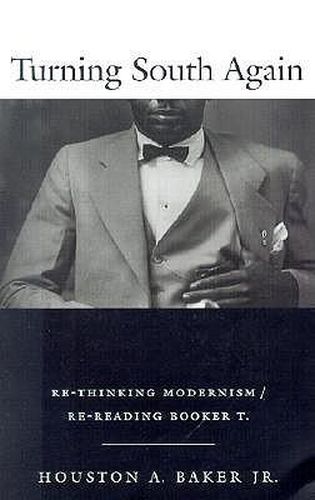Readings Newsletter
Become a Readings Member to make your shopping experience even easier.
Sign in or sign up for free!
You’re not far away from qualifying for FREE standard shipping within Australia
You’ve qualified for FREE standard shipping within Australia
The cart is loading…






In Turning South Again the essayist, poet, and scholar of African-American literature Houston A. Baker, Jr. offers a revisionist account of the struggle for black modernism in the United States. With a different take on the work of Booker T. Washington and the Tuskegee Institute than in his earlier work Modernism and the Harlem Renaissance , Baker combines historical considerations with psychoanalysis, personal memoir, and whiteness studies to argue that the American South and its regulating institutions - particularly that of incarceration - are at the centre of the African-American experience. From the holds of slave ships to the peonage of Reconstruction to the contemporary prison system, incarceration has largely defined black life in the United States. Washington’s school at Tuskegee, Baker explains, housed and regulated black bodies no longer directly controlled by slave-owners. He further implicates Washington by claiming that - in enacting his ideas about racial uplift - Washington engaged in mulatto modernism, a compromised attempt at full citizenship. Combining autobiographical prose, literary criticism, psychoanalytic writing, and, occasionally, blues lyrics and poetry, Baker meditates on the consequences of mulatto modernism for the project of black modernism, which he defines as the achievement of mobile, life-enhancing, public sphere participation and economic solvency for the majority of African-Americans. By including a section about growing up in the South and his return to assume a professorship at Duke, Baker contributes to one of the book’s central concerns: a call to centralize the South in American cultural studies.
$9.00 standard shipping within Australia
FREE standard shipping within Australia for orders over $100.00
Express & International shipping calculated at checkout
In Turning South Again the essayist, poet, and scholar of African-American literature Houston A. Baker, Jr. offers a revisionist account of the struggle for black modernism in the United States. With a different take on the work of Booker T. Washington and the Tuskegee Institute than in his earlier work Modernism and the Harlem Renaissance , Baker combines historical considerations with psychoanalysis, personal memoir, and whiteness studies to argue that the American South and its regulating institutions - particularly that of incarceration - are at the centre of the African-American experience. From the holds of slave ships to the peonage of Reconstruction to the contemporary prison system, incarceration has largely defined black life in the United States. Washington’s school at Tuskegee, Baker explains, housed and regulated black bodies no longer directly controlled by slave-owners. He further implicates Washington by claiming that - in enacting his ideas about racial uplift - Washington engaged in mulatto modernism, a compromised attempt at full citizenship. Combining autobiographical prose, literary criticism, psychoanalytic writing, and, occasionally, blues lyrics and poetry, Baker meditates on the consequences of mulatto modernism for the project of black modernism, which he defines as the achievement of mobile, life-enhancing, public sphere participation and economic solvency for the majority of African-Americans. By including a section about growing up in the South and his return to assume a professorship at Duke, Baker contributes to one of the book’s central concerns: a call to centralize the South in American cultural studies.